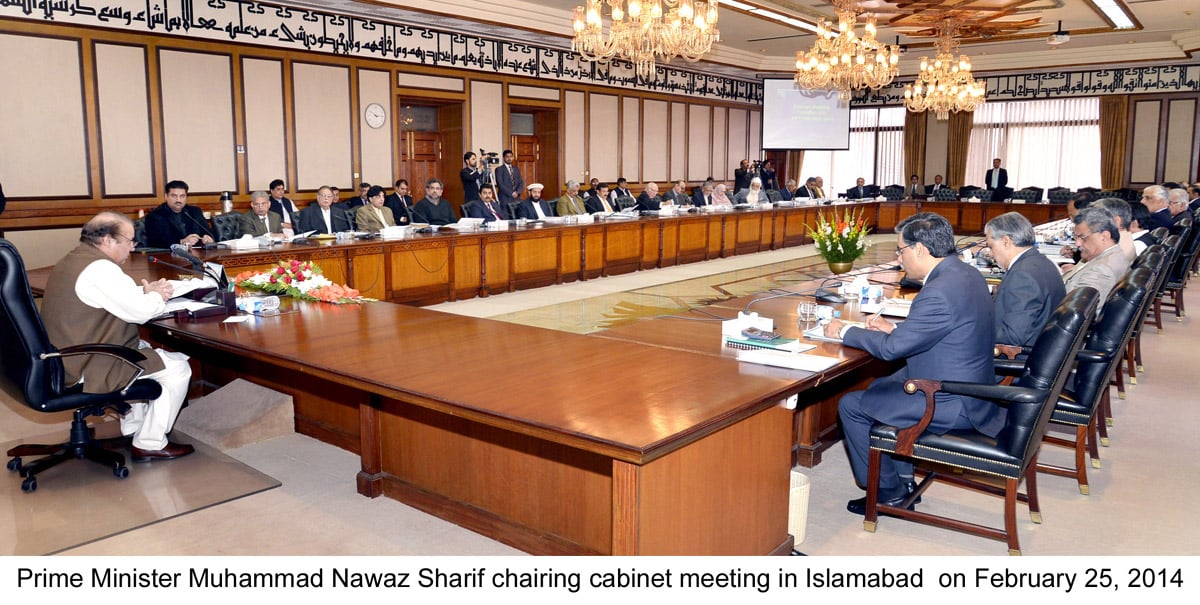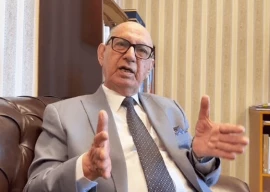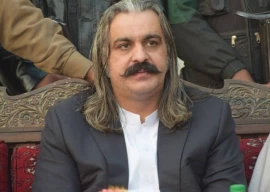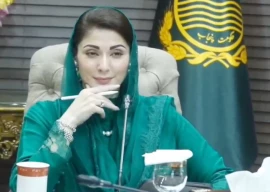
The federal cabinet has unanimously approved the first-ever national security policy with special focus on eliminating all terrorist networks through a combination of measures, including counter-insurgency, intelligence-gathering, policing and prosecution.
Officially, the new policy was not shared with the media -- even after its approval by Tuesday’s cabinet meeting chaired by Prime Minister Nawaz Sharif.
The policy calls for a reassessment of governance, weaknesses and policy deficiencies that have resulted in the exploitation of vulnerable segments of society by militant groups.
The draft of the policy was initially prepared by the National Counter-Terrorism Authority (Nacta) but it was re-crafted by the interior ministry following input from the armed forces, intelligence agencies and other stakeholders
Only the ‘operational part’ of the three-part policy will be made public and Interior Minister Chaudhry Nisar Ali Khan will brief the National Assembly on it on Wednesday (today).
The policy has a multi-layered approach to dismantle, to contain, to prevent, to educate and to reintegrate. The policy proposes that Pakistan follow China’s security model in Hong Kong and Dr Mahatir Mohamad’s security policy in Malaysia to tackle terrorism and extremism.
The policy calls for enhancing the capacity of civilian law enforcement agencies with an effective check on terror financing, protecting assets, buildings and other potential targets and improving the judicial system and anti-terror laws.
The state’s security apparatus, according to the policy, will be strengthened and the police will be the first line of defence and be given proper attention.
The policy notes that counter-terrorism and extremism needs a coordinated response at all levels. This is why its implementation will be ensured at the federal, provincial and district levels under the supervision of the counter-terrorism authority.
In addition, these functions will also be performed at each tier of the government by designated organisations that would partner with Nacta.
Sources told The Express Tribune that all 26 intelligence agencies of the country will coordinate and work in tandem under Nacta.
The policy proposes an urgent study of the country’s education sector to evaluate its role in the development of an extremist mindset and focus on reversing this trend. Interestingly, the madrassa system has not been singled out for reforms, rather the entire system, including curriculum, textbooks and schoolteachers, will be reviewed.
The policy says cleavages in society provide a facilitating environment for terrorists to create sympathisers and recruits, which is why district-level extracurricular activities will be promoted under the policy to allow dialogue between children of all strata.
Furthermore, it proposes a counter-propaganda policy that will highlight atrocities committed by terrorists through the media.
A weaning away process will need to be designed for members with a potential to reform and re-integrate into society, according to the policy. Former jihadis will be asked to identify reconcilable militants for reintegration.
It also focuses on plugging terrorist financing through creation of counter-terrorist financing units at the provincial level and ensuring implementation of the anti-money laundering laws.
Cabinet briefed on talks
At Tuesday’s meeting, the cabinet, according to sources, also discussed the fate of the stalled peace process with the Tehreek-e-Taliban Pakistan. The issue was not part of the agenda but was taken up since it relates to national security, sources told The Express Tribune.
The interior minister briefed the cabinet after some of his cabinet colleagues expressed curiosity about the fate of the peace process.
Nisar admitted that the dialogue had hit an impasse after two deadly attacks by the Taliban: killing of 13 policemen in a suicide attack in Karachi and slaying of 23 paramilitary troops by the TTP’s Mohmand chapter.
After the two incidents, the four-member government negotiating committee had asked the Taliban to cease all terrorist activities. The TTP was also asked to deal with its component groups on its own in case they violate the agreement reached with the government. The cabinet endorsed the committee’s viewpoint, sources said.
Talking over the issue, the prime minister said that “talks and acts of terrorism cannot go hand in hand”. Sources told The Express Tribune that the cabinet backed the government approach to pursue talks only with those groups that are willing to talk, and not with those who are not willing to renounce violence.
On the ongoing surgical airstrikes on militant hideouts, the cabinet decided that the government would retaliate against every act of terrorism.
According to a statement issued by the Prime Minister House after the meeting, the cabinet discussed multifaceted challenges facing the country. The premier underlined the importance of enhancing national security for safeguarding the life and property of citizens and further building the trust of foreign investors in Pakistan.“All necessary steps will be taken to restore peace and put Pakistan on the path to progress and prosperity,” he added.
Published in The Express Tribune, February 26th, 2014.



1731916090-0/sabrina-(3)1731916090-0-165x106.webp)













COMMENTS
Comments are moderated and generally will be posted if they are on-topic and not abusive.
For more information, please see our Comments FAQ